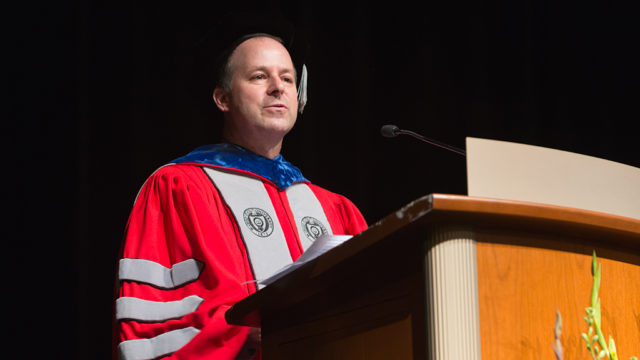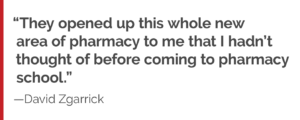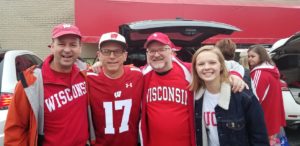
By Katie Gerhards
“Career paths are stepping stones, not necessarily linear trajectories.” That sentiment, delivered by David Zgarrick (BS ’88) during the University of Wisconsin–Madison School of Pharmacy’s 2018 Hooding Ceremony, rings true for most, including Zgarrick himself.
His career — which spans four decades and includes research, professional leadership, and teaching — has been built on a series of what he calls “happy accidents,” starting with being raised in Marshfield, Wis., a small health-care focused city in central Wisconsin. Zgarrick has returned to the faculty as a professor in the School of Pharmacy at Northeastern University. Over the past 25 years he has been a faculty member at Midwestern University–Chicago College of Pharmacy, chair of the Pharmacy Practice departments at Drake University and Northeastern, acting dean of Northeastern’s School of Pharmacy, as well as associate dean of faculty for Northeastern’s Bouvé College of Health Sciences. Zgarrick is currently a member of the UW–Madison School of Pharmacy’s Board of Visitors and serves as the treasurer of the American Association of Colleges of Pharmacy.
“One of the things I’ve learned is to try to keep a very open mind to lots of possibilities,” he says. “This attitude has allowed me to take my career in directions that I would have never anticipated while I was in pharmacy school.”
DiscoveRx talked with Zgarrick to learn more about him, his career, his motivations and where his open-minded approach has taken him.
Q: What excites you about pharmacy?
I feel so fortunate to have chosen a pharmacy as a profession. I started at the School of Pharmacy, admittedly as a premed student, which was not unusual at the time. But when I got into it, I realized that there was so much more to pharmacy than I ever imagined. I enjoy the connection to research, getting the chance to work with faculty, do presentations and submit publications. I feel the same about teaching. When I was a pharmacy student at the School, I had the opportunity to be a student advisor and I served as a teaching assistant for a class, which was really a lot of fun and opened my eyes to a career in education. When I look back, I really feel fortunate that pharmacy has provided so many different pathways and so many different opportunities.
Q: What do you enjoy in your spare time?
I like being outdoors, hiking, cycling and anything else that gets me out of the office and clearing my head. Skiing is probably my favorite thing to do outside. Growing up in Wisconsin, we had like ski hills — or ski bumps, so to speak — but I didn’t ski much. It actually wasn’t until I was around 40 years old, sitting at a Badger game of all places, and my wife said, ‘Why don’t we try skiing?’ So she tried it and really didn’t like it that much, and I tried it and I’ve been hooked for the last 15 years or so. I now ski all over North America, and especially enjoy skiing in New England, where you will often find me at Sunday River in Maine.
Q: Is there a professor who stands out as influential for you from your time at the UW–Madison School of Pharmacy?
During my commencement address at the 2018 UW–Madison School of Pharmacy Hooding Ceremony, one of the things I tried to avoid was naming anyone because there were so many people at the School who played a role in my development as a professional and I wouldn’t want to accidentally leave anyone out.
I will say that there was one advisor who is no longer with us named Phil Mendel (BS ’49), who wrote letters of recommendation for me for various scholarships and awards. I have to say he had the golden touch because every single letter he wrote for me, I ended up getting that opportunity. In addition to being a faculty member at School, he was also the rink announcer for Badger hockey games in ‘60s and ‘70s, so he definitely had a way with words.

Q: We heard you’re working on a book. What is it about?
I am editor of the book, Pharmacy Management: Essentials for All Practice Settings, that’s used to teach pharmacy management in schools of pharmacy. I’ve been doing this almost 20 years, working closely with colleagues and chapter authors around the country. For each edition, the authors update their chapter or create a new one, or occasionally I have to find new authors. Probably the biggest challenge of being an editor is creating a book with over 30 chapters and written by over 60 different authors that reads in a single, cohesive voice. It’s a challenge that I find rewarding.
I also wrote a book called Getting Started as a Pharmacy Faculty Member, which I did with the American Pharmacists Association (APhA) as part of a series of “Getting Started” books. They are aimed at students or new practitioners who are thinking about different career paths in pharmacy, so I wrote the book on getting started in academia as a career. In a lot of ways, the students only see one side of a faculty member, and that’s usually either on the classroom side or the clinic side. But there are so many aspects to what faculty do that most people in our profession don’t know much about.
Q: What motivates you to stay connected to the School?
I recognized very early on that I was getting a lot out of the profession, and that is largely thanks to my experience at the School of Pharmacy and the relationships I built there. I’ve been rewarded with a lot of opportunities and I’ve gotten to do a lot of unique things.

In thinking about how I could help support students get the opportunities I had, I decided to create the Zgarrick Family Scholarship. I remember what it’s like walking across the stage at graduation, not knowing for certain what’s going to happen with the rest of your career, and actually being OK with it. I knew that I was well prepared, and that one way or another I was going to figure it out. The way I was prepared at UW–Madison has provided me and my peers with many opportunities, and because we’ve had those opportunities, we’ve been able to do some really neat things.
Having grown up in central Wisconsin, I felt like Madison was my New York City: If I could make it there, I could make it anywhere! I want my scholarship to be especially available to students from smaller cities in Wisconsin because I want them to know that the UW is their university that has a lot of resources which will prepare them well for the future.
A great asset of the UW–Madison School of Pharmacy is the very active alumni group. Because I’m in Boston, I’m not as active in the School alumni group as I used to be when I lived in the Midwest. I think a great way for alumni to support this School is to be a preceptor — there are so many different ways that we can work with students, whether it’s within our own practices, organizations, or hospitals, or even in research. There’s nothing that keeps you on your toes like having the students around.
Q: If not pharmacy, what would you be doing?
When I was a young child in Marshfield, one of the things I had wanted to do when I grew up was to be a meteorologist. I always watched the weatherman on TV, and in my elementary school I had a weather map which I would update every day. As I got into my teenage years, I had more friends whose parents were associated with health care, so that is what got me thinking about pharmacy and the medical field.
But there’s still something about weather draws me in, especially when I’m out skiing, hiking or cycling. There’s still so much more we have to learn about the weather, especially in this day and age.
Q: What do you hope to see in the future of pharmacy?
We must continue to put our focus on the patient and make sure that the patient is experiencing the best outcomes that are available from their medication. That means pharmacists need to advocate on behalf of their patients. That means they need to practice at the top of their license, while making sure that the right person gets the right drug at the right time. The physical aspects of dispensing are still vital and important, but there’s so much more that pharmacists can do in terms of advising not only patients but other health care professionals on the most appropriate uses of medications.
!["We [pharmacists] are well-positioned to play a vital role in not only keeping patients healthy but, but keeping our communities healthy."](/wp-content/uploads/Pull-Quote_community-300x120.png)
Q: What’s the best career advice you’ve received?
Keep your mind open, and be willing to push yourself out of your comfort zone. Develop a network of mentors and friends, people who you can reach out to for advice, and who will support you regardless of whether things are going well or not so well. To make an analogy between careers and skiing, it’s fair to say that in both areas, you’ll need to be willing to push yourself a bit if you are going to continue to develop. In skiing, it usually starts with taking lessons, but it ultimately comes down to challenging yourself to ski down tougher runs or in more challenging conditions. You are going to fall, you may even hurt yourself, but so long as you learn from your mistakes, with help from your coaches and others who support you, you will master more terrain and gain the confidence needed to become a better skier. Career development really isn’t that different. Pharmacy school provides us with a great box of tools, as well as access to networks of peers and mentors. These can all be put to use has we seek opportunities or consider trying new career paths. Sometimes things will go great, and we’ll have the confidence to take ourselves to the next opportunity. Other times they won’t, but so long as we keep and open mind and have support from our peers and mentors, we’ll keep learning and be ready to continue to develop.
Q: What is your most recent read or Netflix binge?
My wife and I have been binging The Marvelous Mrs. Maisel on Amazon Prime. As far as reading goes, the last book I finished was Hillbilly Elegy by J.D. Vance. I enjoy reading nonfiction, especially because it provides context on different cultures and periods of time. This book in particular illustrates the different perspectives that people bring to education.
As an educator, I think about my students a lot and recognize that they don’t all come from the same place and they don’t have all the same experiences. And yet they all have the same goals. They all want something that’s going to provide them opportunities for a better life. Reading books like Hillbilly Elegy serves to remind us that there are people who are not necessarily like ourselves or at least didn’t have the same experiences as we may have. I value diversity immensely, I continually want to learn more about others and their experiences. And with that said, I’m constantly looking for what ties us together as opposed to what brings us apart. It was a reminder that my knowledge and my expertise in pharmacy has enabled me to help people achieve things that we all want.
Do you have an idea for an alumni feature? Let us know!